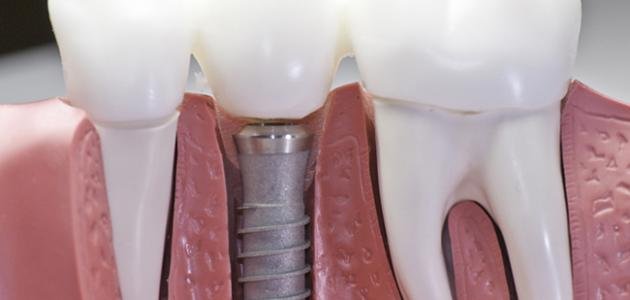I apologize for my slightly weak English language in the medical field
Dental implants are intended to implant new metal implants by replacing damaged or damaged teeth or to compensate for missing teeth as a result of diseases that cause advanced tooth damage.
Damage and tooth decay can result from chronic bacterial infection in the tissues surrounding the tooth (responsible for providing support to the tooth), first through the formation of a bacterial plaque on the teeth, and later by causing inflammation of the surrounding tissues.
The implants are installed in the jaw, used to create a strong base for building an over-age structure by placing a crown, or other alternative building for age in order to rebuild the oral cavity.
In some cases, permanent implants are preferred instead of other treatments for repair and reconstruction, such as a bridge or nerve root treatment, which is a major inconvenience to the patient and which is not always successful. On the other hand, the treatment of dental implants is not easy treatment, it is expensive, and causes a lot of pain and discomfort. The main advantage of treatment is that it provides a permanent and good alternative to teeth for many years.
Preparation for Dental Implant Surgery:
Most dental implants are performed under the influence of local anesthesia only, although dental implants can also be performed under the influence of general anesthesia.
Before dental implants, the patient is required to have a dental examination. A special image (dental x-ray) or even a CT scan is required to detect and diagnose dental cases that can not be seen through regular examination.
In healthy people there is no need to make special preparations. While people who are at risk of endocarditis, such as people with artificial valves, are immunocompromised and others, they should inform the surgeon of this, in order to receive antibiotics before dental implants.
People suffering from blood clotting disorders are required to undergo blood clotting before the operation because they are more likely to have bleeding.
In addition, in order to obtain the best results from a cosmetic point of view, it is usually necessary to carry out a series of initial tests, to establish a tooth structure of a similar texture color as possible to the original teeth.
In cases where the jawbone tissue is unsuitable for transplantation, several months prior to dental implants should be performed to establish an appropriate area in the tissue for implantation.

Dental implants process:
Dental surgery is performed in the clinic under sterile conditions, by a dentist specializing in dental implants and / or oral and maxillofacial surgery. The patient is anesthetized by injecting it with a local anesthetic in the tooth area, as in regular dental treatments (sometimes the anesthesia is needed to expand, according to the implantation site).
If the bone is ready to receive implants (sometimes after a series of pre-treatments), a dental implant can be started. Screws are installed in metal screw screws, with jaw bone.
In another series of treatments after a period of insertion of the bolts, reconstruction begins by taking measurements and creating the crown / bridge. When it comes to the waiting period between installation of implants and the implementation of final adoption, there is more than one approach. The approach is often to wait at least 6 weeks for the tissue to heal and sometimes wait for several months.
Risks of dental implants:
General Risks of Surgery:
Infection in the surgical incision - usually superficial and treated locally. In rare cases, a more serious infection may occur which may reach the bloodstream causing sepsis. Infection may reach the heart valves leading to endocarditis, It is rarely necessary to reopen the surgical incision in the toothpaste to remove the bacterial residue.
Bleeding - especially in the operation area as a result of exposure to tissue for the disease. Bleeding can occur immediately after surgery, and may occur 24 hours after surgery and in rare cases after weeks or months. Bleeding occurs due to the rupture and bleeding of a blood vessel in the toothpaste. If the bleeding is severe, which is rare, it must be performed.
Bleeding occurs when small blood vessels open in the gums and bleed. In cases where there is heavy bleeding there is a need for discharge but this is very rare.
Risk of Anesthesia - Symptoms are usually associated with hyperhidrosis towards anesthetics (allergic response). In rare cases, a serious reaction may be a severe drop in blood pressure (Anaphylactic shock).
Risks of dental implant surgery:
Damage to the nerve - which may cause numbness / numbness in the mouth or damage to the taste. Rarely occur and be temporary in most cases.
Allergy to heat / cold in the oral cavity - often disappears after placing the building.
Treatment after surgery:
There is no need to keep the patient under observation after dental implants. He should avoid eating or drinking for two hours after surgery, until the effect of anesthesia ends. May feel pain in the area, especially the first day after transplantation of mineral implants, painkillers can be used as needed. The area of the toothpaste may swell for several days.
In order to get the best results after dental implants, you should take care of the teeth and clean the mouth regularly, including cleaning the teeth with a soft brush (to prevent tooth injury) and cleaning with special equipment. If there is high fever, severe pain, bleeding or spot secretions from the mouth, you should go to the doctor immediately.

Do follow, resteem and upvote
Thanks ;-)
Hi! I am a @illusiveshakel. I just upvoted you!
Commenting on a blog is an art. Good comments create relations. You’re doing great work. Keep it up.
thank you